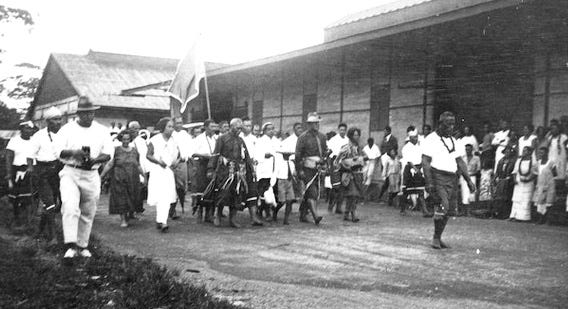Richardson was ready to exile his enemies. Just before Christmas 1927, Nelson, Gurr and Smyth received letters demanding they show cause why they should not be deported. Gurr, cited as editor and publisher of the Sāmoa Guardian, was accused of using his ‘wide knowledge of the language, custom, mentality, prejudice, party rivalries and history of the Sāmoan people’ to mislead them. The show-cause letters were pro-forma: exile was inevitable. Ta’isi and Gurr were exiled for five years, Smyth for three. It made Christmas Eve headlines in New Zealand with many describing Ta’isi as a ‘half-caste Sāmoan’ and Gurr once holding a ‘government appointment in American Sāmoa, but dismissed for “malfeasance in office.”’ Christchurch’s Press said there was nothing like civil war threatening in Sāmoa. The deportee’s crimes had been to embarrass the administration. It should have been dealt with in court and they questioned deportation powers given to Richardson: ‘This is a rather greater power than British people care to see in the hands of any single official’. The Auckland Star said the move was against traditional and deeply rooted ideas of British justice: ‘It is not only that the banishment is wrong in principle, but that it is very severe in its terms.’ A former premier of New South Wales, Sir Joseph Carruthers, condemned it as ‘a monstrous injustice’ in which one man had become ‘prosecutor, judge and jury at his own mere whim of pleasure….’ Coates responded that everything was ‘going smoothly’. The three deportees had been a menace to peace and good government but New Zealand was determined to ‘act up to our responsibilities’. Sāmoa’s administration had become largely ineffective and a large percentage of the population were in a state of passive resistance: ‘So far as they are concerned, the king’s writ is not running.’ It would affect the prosperity of Sāmoa for years to come. Mau activities were impacting Sāmoa's health administration (Coates did not mention New Zealand’s disastrous record). Europeans were causing trouble, particularly Ta’isi with his wealth. Deportation was not a punishment for a crime or an offence.
‘It is not in the strict sense of the term a judicial act, it is an executive act, taken not as a penalty but as a preventative measure, to facilitate the good government of the territory.’
Mau members from Palaluli protested ‘swinging axes under the noses of the police,’ Braisby said, ‘firing shotguns in the main street of Āpia, singing insulting songs about the governor and wearing war costumes.’ Richardson reported that they had marched through the streets singing ‘defiant and obscene songs’. He saw it as an insult to New Zealand’s dignity. Richardson began an investigation, calling in Palauli matai, Autagavaia and Lagaaia. They refused to attend. Richardson telegrammed Wellington asking for six more policemen. The six were sent but Coates said any move to arrest the two would conflict with Richardson's intention of ending the Mau without the use of force.
Keep reading with a 7-day free trial
Subscribe to Michael Field's South Pacific Tides to keep reading this post and get 7 days of free access to the full post archives.




